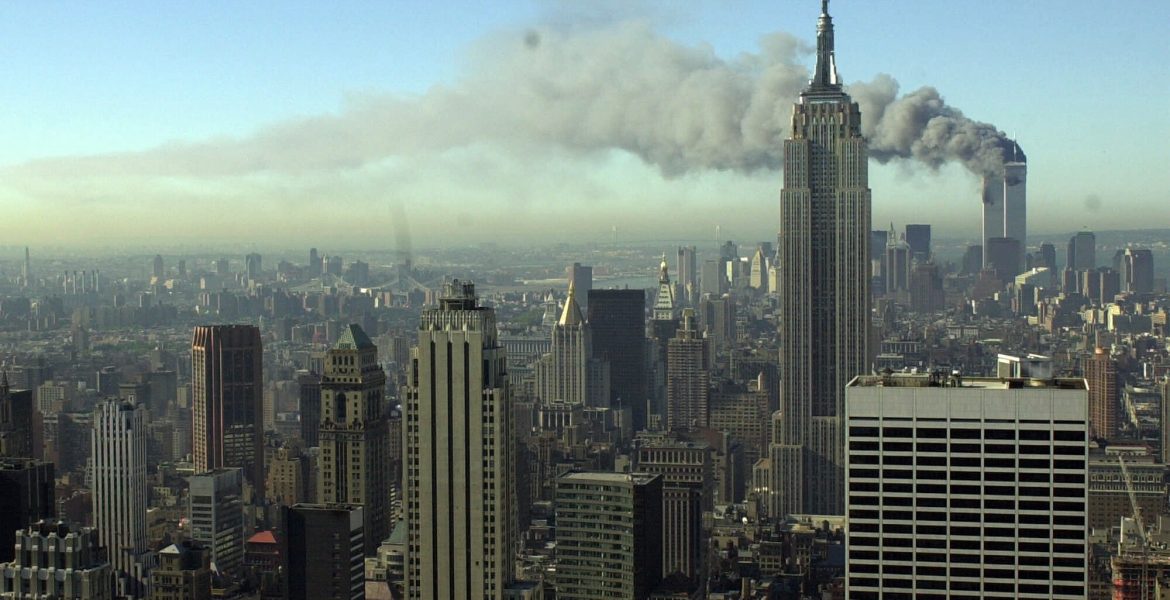It was 3:03 p.m. in Stuttgart, Germany, where Edward Westermann, regents professor of history, was stationed in the Air Force on Sept. 11, 2001.
“I saw the story come up about the first aircraft,” Westermann said. “I saw the tower burning… then as we were watching, I saw that second aircraft hit. It was very clear to us that that was now a terror attack.”
American Airlines Flight 11 struck the North Tower of the World Trade Center at 8:46 a.m. Eastern Daylight Time Sept. 11, 2001, in New York City after being hijacked by al-Qaida terrorists.
United Airlines Flight 175 followed at 9:03 a.m., colliding with the South Tower. At 9:37 a.m., Flight 77 crashed into the Pentagon in Washington, D.C.
19 al-Qaida terrorists hijacked four planes. The fourth plane crashed in a field in Shanksville, Pennsylvania.
Close to 3,000 people died and thousands more were left injured as a result of the attacks.
University veterans recall the impacts of the tragic 9/11 terrorist attacks as its 20th anniversary nears.
Richard Delgado, executive director of Military Affairs and Strategic Influences, was stationed in the Marine Corps in San Diego that day. He said he remembers finding out about the terrorist attacks on television, too.
“I was on active duty in the Marine Corps,” said Delgado, who joined the military in 2000 and worked in aviation operations. “We saw it on TV. like the rest of the world. We went into protective mode.”
Delgado said he felt shock and disbelief as he watched the news but didn’t have time to process it since they had to get to work.
Delgado said his team started protecting the air space in San Diego and on the oceanside.
“It immediately turned into protecting the assets of the Marine Corps along with what was going on with orders coming down from the Pentagon and others,” Delgado said.
Westermann recalls having a similar approach to the situation overseas.
“I think with most Americans your initial response is: unbelievable, but then because you’re in the military you have to start problem-solving,” Westermann said.
Westermann started in the Air Force Academy in 1980 and retired from the military in 2009. He spent two years stationed in Germany; he was the executive officer to the general and sergeant.
Westermann said the U.S. base in Stuttgart was the biggest U.S. base in Europe. People from all military branches were stationed there. Because it was the U.S.’s central headquarters in Europe, he said he didn’t know if they would also be targeted.
Westermann said the base had to collect information on how the military had to proceed. He said they had to make plans to move aircrafts and people in response to the attacks.
In the days following 9/11, Westermann said it became more difficult to enter the base. He said he recalled taking two to three hours to get through security.
There was an increase in security measures seen in airports and the Patriot Act, where the government has more authority to look at information in cell phones and emails, Westermann said.
“You kind of gave up a certain amount of freedom for more security,” Westermann said.
There was a sudden change in airport protocol. People used to be able to go up to the gate to say their goodbyes but now it’s done before passing airport security, he said.
Delgado said people are no longer allowed to stand near an airplane’s cockpit as there are security measures to ensure no one gets in.
Delgado said he knew due to the devastation of what occurred on 9/11 and the amount of lives lost, there would be repercussions.
“With repercussions comes a war somewhere,” Delgado said. “Anybody in uniform could have told you that the few days afterward we knew we were going to embark on a war.”
Delgado said he knew war was coming because there were few occasions where attacks on American soil were left without repercussions.
Delgado said the U.S. went to “handle what it needed to handle” in Afghanistan. The U.S. increased its involvement in Afghanistan to control terrorists, he said.
Westermann also said the U.S. re-shifted its interest to the Middle East to combat terrorism. A lot of resources, money and lives were lost in the Middle East as the U.S. tried to bring stability there, he said.
“It really changed the way in which the U.S. military thought about combat as well, from conventional warfare to insurgency warfare, which is really different,” Westermann said about the U.S. military presence in Afghanistan.
Westermann said insurgency warfare included irregular, non-uniformed or guerrilla fighters.
Almost 20 years after Sept. 11, 2001, President Joe Biden withdrew American troops from Afghanistan.
“I worry about the end in Afghanistan, what that now is going to do to America,” Delgado said. “ISIS and terrorism as a whole may be back on the rise. Are we as America prepared for another attack to U.S. soil?”
Delgado, who left the military in 2010, said it is important to remember the number of lives lost during the tragic attack.
“We need to never forget what that did to America,” Delgado said.
Westermann said the incident reminds the U.S. things happening in other countries can have a huge impact on Americans’ own way of life. Americans can’t ignore the bigger connection the U.S. has with the world.
“I think it’s important to remember it because it reminds us that we are a very prosperous nation (and) have a lot of advantages but are still connected with the larger global community,” Westermann said.






